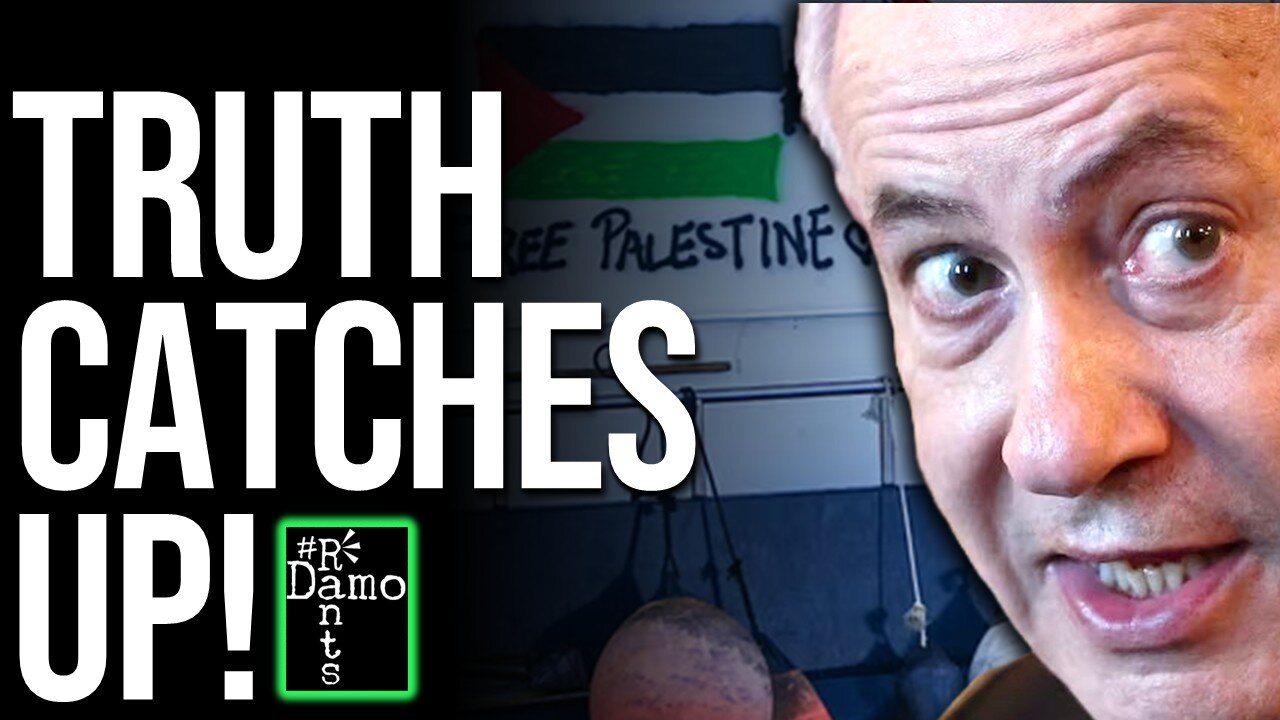Premium Only Content

Israel Seizes Another Gaza Flotilla — But Not The Evidence Against Them
Right, so it says a lot about Israel’s idea of “security” that what it now fears most are doctors and journalists in a dinghy. Every few months, two in the last month, another convoy of civilians sets out to deliver food and medicine to Gaza, flotilla’s of vessels carrying aid and human decency — and every time, Israel scrambles its navy as if the fate of the state depended on stopping a few boxes of paracetamol. The Freedom Flotilla Coalition’s latest mission, in the immediate aftermath of the much larger Sumud Flotilla, was no different: nine boats, ninety-three passengers, and one superpower-backed military sent to intercept them, once again committing piracy in international waters. You would think a country that claims moral authority might feel embarrassed by this spectacle by now, but Israel calls it law enforcement, and its allies just nod along as if international law wasn’t being repeatedly trampled and there’s nothing they could do. It’s the same story every time: a government terrified not of weapons, but of witnesses.
Right, so in the wee small hours of this morning, Israeli naval forces intercepted the latest aid flotilla aiming to break the siege of the Gaza. A convoy of nine civilian vessels in the eastern Mediterranean. The ships were organised by the Freedom Flotilla Coalition and the Thousand Madleens to Gaza campaign. Their stated objective was to deliver humanitarian aid to the Gaza Strip and to challenge Israel’s maritime blockade.
According to information released by the organisers, the flotilla carried ninety-three passengers from various countries, including journalists, doctors, elected officials, and civil society representatives. The lead ship, The Conscience, the same vessel struck transported more than one hundred and ten thousand US dollars’ worth of medical and nutritional supplies, including medicines, respiratory devices, and fortified food for hospitals.
The convoy was sailing roughly one hundred and twenty nautical miles from Gaza—well outside Israel’s territorial waters—when it was surrounded by Israeli naval vessels and ordered to stop. The organisers state that the ships were boarded and seized by armed personnel, and that communications with the flotilla were severed shortly afterwards. All things we’ve come to expect from Israel in response to attempts to bust their 18 year long blockade of the Strip. Israel confirmed the operation and described it as an enforcement action under what it calls a legal naval blockade of Gaza and all passengers were taken to back to port, no doubt to await much if the mistreatment we’ve heard about from recently released Sumud flotilla crew members, before eventual deportation.
Israel’s blockade of Gaza was introduced in 2007 following the election to power of Hamas. Israel argues that the measure is a legitimate security response intended to prevent weapons smuggling and attacks on Israeli territory, but really it was an exercise in democracy that they didn’t like the result of. They preferred their patsies in the Palestinian Authority to be in charge and so did the PA, Mahmood Abbas refused to cede power and has remined leader in the West bank ever since, despite losing that election, having not held one since. Human rights organisations and UN bodies have long disputed the legality of the Israeli blockade. Their central argument is that the blockade imposes indiscriminate restrictions on two million civilians, amounting to collective punishment prohibited by the Fourth Geneva Convention and the last two years of genocide has shone a light on that like never before.
Under the United Nations Convention on the Law of the Sea, coastal states do not have general jurisdiction to detain foreign civilian vessels in international waters, yet Israel has got away with doing so repeatedly now. Limited exceptions exist for acts such as piracy, slave trading, or unauthorised broadcasting, but Israel are the ones committing piracy here. Interception is otherwise lawful only when authorised by the UN Security Council or the flag state of the vessel. These conditions have not applied to any flotilla mission.
The humanitarian context in Gaza remains critical as well. Long-term import restrictions, military operations not to mention the last two years of genocide have damaged infrastructure, limited fuel supply, and restricted access to medical equipment. Hospitals report chronic shortages of essential medicines, if they themselves are even still standing and international agencies describe widespread food insecurity as Israel weaponises starvation. Against that background, humanitarian organisations continue to send convoys by land and sea in an attempt to deliver supplies directly.
Eyewitness accounts from passengers describe Israeli naval vessels approaching the flotilla before dawn. Boarding teams used ladders and small craft to seize control of the ships. The flotilla’s communication links were cut shortly after the approach. All nine vessels were later taken to Israel.
Governments in Europe and the Middle East confirmed that their nationals were among the detainees and requested information from Israeli authorities.
The cargo was confiscated. $110,000 worth of aid that will be denied to Gaza.
Israel describes these as enforcement actions under the law of naval warfare. Organisers and independent legal experts describe them as violations of maritime law and humanitarian obligations.
From a legal perspective, the key issue is jurisdiction. The flotilla was sailing in international waters when intercepted. Under customary international law, states cannot extend their domestic enforcement powers to the high seas except in defined cases as already described. Israel’s claim that the blockade justifies such actions is disputed because the blockade itself is not universally recognised as lawful.
The law of naval warfare, as codified in the San Remo Manual, allows blockades during armed conflict under specific conditions: they must be declared, effective, non-discriminatory, and must not cause excessive harm to civilians. Israel’s blockade fails all of these conditions, particularly the prohibition on starving civilian populations as a method of warfare.
In practical terms, Israel’s enforcement actions extend its control well beyond its territorial waters. Boarding civilian aid ships more than one hundred nautical miles from its coast effectively asserts authority across a large portion of the Mediterranean. And yet nobody says anything about it.
The interception drew immediate but limited diplomatic reaction. Governments whose citizens were aboard the flotilla requested access to detainees and called for their release. Some described the incident as an infringement of international law, while others confined their responses to general calls for restraint. No government initiated legal proceedings or imposed sanctions. So where is the deterrent to Israel committing acts of piracy as they keep doing against civilian flotilla missions?
Turkey, Malaysia, and other states condemned the operation outright, describing it as piracy and an unlawful use of force against civilians. European governments issued routine statements of concern but avoided direct criticism. The United Nations noted the incident but took no further action, except to Chinese burn another layer of skin off their wrists.
This pattern of limited diplomatic engagement has followed every flotilla interception since 2010. The absence of legal follow-up every time indicates that political considerations continue to outweigh concerns about legality.
Information about the October operation reached the public through footage and statements released by the organisers and passengers before communication was cut. Photographs and short video clips circulated online showing naval vessels approaching the convoy.
The humanitarian situation in Gaza is central to the flotilla campaign. Organisers argue that direct delivery by sea is necessary because land crossings are frequently closed or heavily restricted as we know them to be. Although no major flotilla has succeeded in reaching Gaza, each mission draws attention to the continuing blockade and its consequences.
The October flotilla, like those before it, carried both material aid and symbolic significance. For residents of Gaza, awareness that international volunteers continue to attempt such missions is interpreted as a sign of continued solidarity. The supplies themselves are small compared to Gaza’s needs, but the visibility of the effort serves as a reminder that the blockade remains contested.
For Israel, the flotillas are viewed as political challenges intended to undermine its blockade policy and international standing. The state’s consistent response—interception, detention, and deportation—reflects a strategic calculation that allowing even one convoy to reach Gaza would create a precedent difficult to reverse.
From a security perspective, the blockade remains central to Israel’s policy toward Gaza. Allowing foreign vessels to reach the territory would weaken the state’s claim that it controls maritime access and would invite further attempts. However, repeated interceptions also generate reputational damage.
Each incident reinforces the perception that Israel enforces its blockade through actions that conflict with international norms. Humanitarian groups and legal scholars cite the raids as evidence of systematic violations of international law. Over time, this accumulation of incidents forms a public record that undermines Israel’s claim to act strictly within legal boundaries.
The state’s dilemma is structural. If it refrains from enforcement, it concedes that the blockade is not absolute; if it enforces it, it exposes itself to accusations of illegality. This contradiction cannot easily be resolved without a fundamental policy change or international adjudication.
Participants increasingly describe their work as “civilian enforcement of international law.” The logic is straightforward: if governments will not act to uphold humanitarian principles, citizens will attempt to do so through direct, non-violent means.
The more frequently these operations occur, the more they highlight the divide between legal principle and political practice.
Control of information has become a defining feature of the flotilla conflict. Israel seeks to prevent live broadcasting from the ships, citing security concerns. Organisers attempt to maintain constant data transmission to document any use of force. The struggle over communications is therefore also a struggle over narrative control.
Despite Israel’s technological advantage, total information control is no longer possible. Video evidence from past raids remains archived and accessible, contributing to the gradual erosion of official narratives. This latest operation was smaller and generated less footage than previous missions but still reinforced the perception that Israel responds to civilian activism with military methods.
Under humanitarian law, warring parties must allow and facilitate rapid and unimpeded passage of humanitarian relief for civilians in need. Denying such relief without military necessity is unlawful. The repeated interception of clearly identified aid ships, even if justified by security arguments, challenges the credibility of Israel’s adherence to this principle.
No international tribunal has yet ruled directly on the Gaza blockade’s legality or on individual flotilla incidents. However, documentation from these missions contributes to a growing body of evidence used by human rights organisations and legal experts in broader investigations into Israeli conduct. Whether this evidence will ever result in prosecutions or formal findings remains uncertain.
The recurring cycle of interception and diplomatic inaction reveals the limits of international governance. Each incident is treated as a political issue rather than a legal one. States express concern but avoid steps that might impose consequences. Over time, this selective enforcement weakens the authority of international law itself.
For Israel, the absence of enforcement acts as a de facto endorsement of its blockade policy. For humanitarian actors, it confirms that political power rather than legal obligation determines state behaviour. The flotilla movement’s persistence can be seen as an attempt to counter that dynamic through continuous documentation and public exposure.
Gaza’s civilian population continues to experience severe humanitarian deprivation.
In this context, the humanitarian shipments carried by the flotillas are small in scale but significant in principle. They illustrate the gap between what international law requires and what political realities permit. Each interception keeps that contradiction visible. So if you’ve been asking yourself what is the point of these voyages if Israel always stop them and nobody stops Israel, well this is it. It shames those who do nothing, whilst keeping the plight of Gaza through the blockade and through the starvation in people’s minds.
So given the entrenched positions of both sides, similar incidents are expected to continue. Israel is unlikely to alter its enforcement policy, without state intervention and the Freedom Flotilla Coalition will launch future missions. Without a negotiated end to the blockade or an international ruling clarifying its legality, the confrontation will persist as a recurring feature of the regional conflict.
Each new mission will generate additional documentation, diplomatic statements, and public debate. The cumulative effect will be to maintain scrutiny of the blockade and to record its enforcement methods in detail.
The October 2025 interception demonstrates the persistence of a situation that is both politically unresolved and legally ambiguous. It confirms that humanitarian activists remain willing to test the blockade, that Israel remains determined to prevent any breach, and that the international community remains reluctant to intervene decisively.
From a factual standpoint, the flotilla did not reach Gaza, the aid was confiscated, and the passengers were detained and deported. From a legal standpoint, questions about jurisdiction, proportionality, and humanitarian obligation remain open and in public discourse. From a political standpoint, the operation reinforced existing narratives on both sides rather than changing them.
The longer-term consequence is cumulative: every interception adds another example of extraterritorial enforcement and another record of how humanitarian law is applied—or ignored—in practice.
This latest flotilla incident fits a pattern that has persisted for over fifteen years. Civilian groups continue to test Israel’s maritime control through humanitarian voyages. Israel continues to treat those voyages as security threats and enforces its blockade through military means. International institutions issue statements but impose no penalties.
This repetitive cycle sustains itself because the legal and political incentives remain unchanged. For Israel, enforcement maintains the appearance of control. For humanitarian actors, sailing demonstrates that the blockade remains a contested and controversial policy and the more attention we draw to it, the more people will come to understand this.
Until the blockade’s legality is finally challenged and acted against by state powers, the pattern will continue. Each new interception will add to a growing historical and evidentiary record, as well as pressure on those states and their leaders who continue to ignore it. The flotillas may not reach Gaza, but they ensure that the question of Gaza’s isolation remains visible, documented, and impossible to ignore. So bring on the next.
For more on what those taking part in the last flotilla, the Sumud Flotilla, have been put through by Israel, do check out this video recommendation here as your suggested next watch.
Please do also hit like, share and subscribe if you haven’t done so already so as to ensure you don’t miss out on all new daily content as well as spreading the word and helping to support the channel at the same time which is very much appreciated, holding power to account for ordinary working class people and I will hopefully catch you on the next vid. Cheers folks.
-
 LIVE
LIVE
Glenn Greenwald
2 hours agoProf. John Mearsheimer on Trump's Knesset Speech, the Israel/Hamas Ceasefire, Russia and Ukraine, and More | SYSTEM UPDATE #530
1,084 watching -
 DVR
DVR
BonginoReport
2 hours agoTrump Brokers Peace In The Middle East - Nightly Scroll w/ Hayley Caronia (Ep.154)
22.3K9 -

The Nick DiPaolo Show Channel
4 hours agoTrump Pulls Off Unthinkable | The Nick Di Paolo Show #1803
6.03K6 -
 LIVE
LIVE
Katie Miller Pod
2 hours agoEpisode 10 - Kellyanne Conway | The Katie Miller Podcast
688 watching -
 LIVE
LIVE
Dr Disrespect
8 hours ago🔴LIVE - DR DISRESPECT - BATTLEFIELD 6 - JET CRASHES, EXPLOSIONS, 360 NO-SCOPES
2,085 watching -
 LIVE
LIVE
Rallied
1 hour agoBF6 with THE BOYS
137 watching -
 LIVE
LIVE
The Mike Schwartz Show
3 hours agoTHE MIKE SCHWARTZ SHOW Evening Edition 10-13-2025
2,807 watching -
 58:57
58:57
TheCrucible
2 hours agoThe Extravaganza! EP: 52 with guest host Rob Noerr (10/13/25)
53.8K8 -
 LIVE
LIVE
Blabs Games
9 hours agoApex Legends With Lumpy Potato | Noob Plays
25 watching -
 LIVE
LIVE
StoneMountain64
5 hours agoBattlefield 6 Flick Keybind is WILD
213 watching